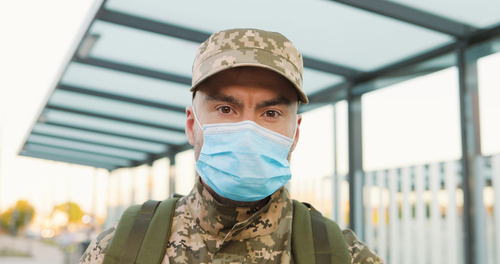
Nearly 2,000 Marine recruits were put into a two-week quarantine before starting basic training, according to a study from the Icahn School of Medicine at Mount Sinai and the Naval Medical Research Center, and despite this, asymptomatic transmission of COVID-19 still occurred.
Published this week in The New England Journal of Medicine, the results showed that few infected recruits demonstrated symptoms before a proper SARS-CoV-2 — the virus that causes COVID-19 — diagnosis, but transmission spread regardless. It also breached many of the best-practice public health measures, becoming realized only through scheduled tests, not tests ordered in response to symptoms.
It has stark implications for the effectiveness of public health measures in guarding populations against COVID-19 transmission.
“This is a difficult infection to suppress in young people, even with close supervision of their mask-wearing, social distancing, and other mitigation measures,” Dr. Stuart Sealfon, a professor of neurology at the Icahn School of Medicine at Mount Sinai, said. “We find that regular testing not dependent on symptoms identifies carriers who can transmit SARS-CoV-2. We hope this information helps in developing more effective measures to keep military installations and schools safe.”
Daily temperature and symptoms checks were conducted on all recruits but failed to detect infections. Recruits were spread across nine Marine recruit classes, in which they were required to follow strict group quarantine measures and placed in two-person rooms over the course of two weeks. Each recruit class was housed in different buildings, with different dining times and training schedules, to prevent interaction. All recruits wore cloth masks, practiced social distancing, and regularly washed their hands. Most instruction was undertaken outdoors, and after each class finished quarantine, deep cleaning was conducted on all surfaces before the arrival of the next class.
“The identification of six independent transmission clusters defined by distinct mutations indicates that there were multiple independent SARS-CoV-2 introductions and outbreaks during the supervised quarantine,” Dr. Harm van Bakel, assistant professor of genetics and genomic sciences at the Icahn School of Medicine at Mount Sinai, said. “The data from this large study indicates that in order to curtail coronavirus transmission in group settings and prevent spill-over to the wider community, we need to establish widespread initial and repeated surveillance testing of all individuals regardless of symptoms.”
The virus was largely transmitted within a given platoon group, where recruits were more likely to be near one another.

